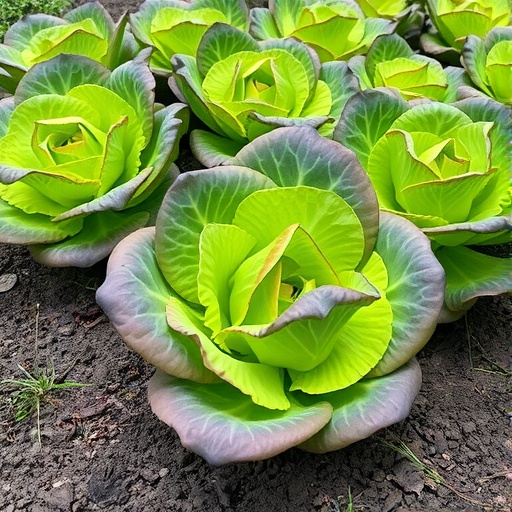In an era increasingly marked by climate variability, agricultural scientists and researchers are continuously seeking innovative solutions to bolster crop resilience in the face of escalating environmental stressors, particularly drought. Newly introduced findings from a groundbreaking research project led by Abdelhamid, A., Nizar, E.M., and Farid, E. unveil a compelling strategy that utilizes steel slag-based compost teas to significantly augment the yield, biochemical, and physiological performance of lettuce crops under drought conditions. This innovative approach not only proposes an effective means of enhancing crop resilience but also speaks to the larger imperative of sustainable agricultural practices.
Historically, drought has been one of the most significant barriers to crop productivity. With rainfall patterns becoming increasingly erratic, many farmers have struggled to maintain yields, which in turn threatens food security. The study conducted by this research team highlights the urgent need for sustainable methods that can lead to improved crop performance while also being environmentally responsible. The use of steel slag, a byproduct of steel manufacturing, transforms waste into a resource, promoting circular economy principles in agriculture.
The researchers delved into the biochemical aspects of this compost tea, which is created by steeping steel slag in water, allowing beneficial nutrients and microbes to leach out. This compost tea is then applied to lettuce crops, which were previously subjected to drought to simulate real-world agricultural challenges. Early results indicate a striking enhancement in key physiological indicators, which are critical for plant health and development. The tea appears to stimulate plant metabolism and improve water use efficiency, vital factors contributing to better growth under stress conditions.
In terms of yield, the findings are indeed promising. Lettuce plants treated with steel slag-based compost teas demonstrated higher biomass and better overall development compared to their untreated counterparts. This is particularly noteworthy in the context of their resilience to water scarcity. Increased yield potential not only provides direct benefits to farmers through enhanced efficiency but also implies greater accessibility to fresh produce for consumers, further supporting food systems.
Moreover, the introduction of steel slag-based compost teas could lead to significant advancements in soil health. Soil degradation is a pressing issue that contributes to reduced agricultural output. By incorporating steel slag into the gardening process, farmers can improve soil structure, enhance nutrient retention, and boost biological activity within the soil, creating a beneficial cycle that underpins future crop productivity. The study highlights the multifaceted advantages of this approach, suggesting that it is not merely a stopgap solution but a long-term strategy for sustainability.
The research team also examined the physiological performance of the lettuce under drought stress, shedding light on the plant’s ability to cope with limited water availability. They measured various physiological parameters, including photosynthetic efficiency, stomatal conductance, and water use efficiency, all of which are critical for maintaining plant health. The enhanced physiological performance observed among treated plants emphasizes the need for integrative strategies that consider both plant and soil health in tandem.
The scientists emphasize that while the application of compost teas derived from steel slag is an innovative practice, it should be viewed within the larger framework of sustainable agriculture. The advantages of utilizing an industrial byproduct align seamlessly with the principles of waste minimization and resource recovery in agriculture. Simplifying the supply chain and reducing reliance on synthetic fertilizers stand as essential measures in the pursuit of environmental sustainability.
Ultimately, the implications of this study extend beyond the immediate benefits to lettuce crops. The insights gained from employing steel slag-based compost teas could encourage further research into similar applications for other crops susceptible to drought or nutrient-poor conditions. Such expansion of the research scope could pave the way for a more comprehensive understanding of how various agricultural byproducts can be harnessed in ways that contribute to resilient and sustainable farming practices.
As agricultural practices aim to adapt to the challenges posed by climate change, research like this provides essential knowledge for policymakers, farmers, and stakeholders alike. The potential for using waste products, such as steel slag, presents an exciting frontier in the realm of sustainable agriculture. It highlights the idea that innovative waste management processes can lead to significant advancements in food production systems, ultimately promoting food security in our changing world.
Furthermore, while there is skepticism and challenges about integrating new practices into traditional farming, the results displayed in this study are expected to captivate interest within the agricultural community. The impressive results can encourage broader acceptance and implementation of compost teas, despite initial reservations about their effectiveness and practicality.
In conclusion, the research conducted by Abdelhamid and colleagues presents a transformative strategy in enhancing the performance of lettuce under drought stress while also advocating for the sustainable use of steel slag in agriculture. This innovative approach promises not only to improve crop yields but also to foster a healthier ecosystem, ultimately promoting a resilient agricultural landscape ready to face the challenges of the future.
The innovations wrapped in this research open a new chapter in understanding sustainable agricultural practices. As the planet grapples with the alarming realities of climate change, approaches such as steel slag-based compost teas may very well lead the way towards a more sustainable and secure agricultural future.
Subject of Research: Sustainable Agricultural Practices Using Steel Slag-Based Compost Teas
Article Title: Steel Slag-Based Compost Teas: An Innovative Strategy To Enhance Yield, Biochemical, and Physiological Performance of Lettuce Under Drought Stress
Article References:
Abdelhamid, A., Nizar, E.M., Farid, E. et al. Steel Slag-Based Compost Teas: An Innovative Strategy To Enhance Yield, Biochemical, and Physiological Performance of Lettuce Under Drought Stress.
Waste Biomass Valor (2025). https://doi.org/10.1007/s12649-025-03357-2
Image Credits: AI Generated
DOI:
Keywords: Sustainable agriculture, compost teas, steel slag, drought resilience, lettuce yield.
Tags: biochemical performance of lettucecircular economy in agriculturedrought-resistant lettuce cultivationeco-friendly farming techniquesenhancing crop resilience strategiesenvironmental stressors in farmingfood security and climate variabilityimproving crop yields with compostinnovative agricultural solutionsnutrient leaching from steel slagsteel slag compost teassustainable agricultural practices





